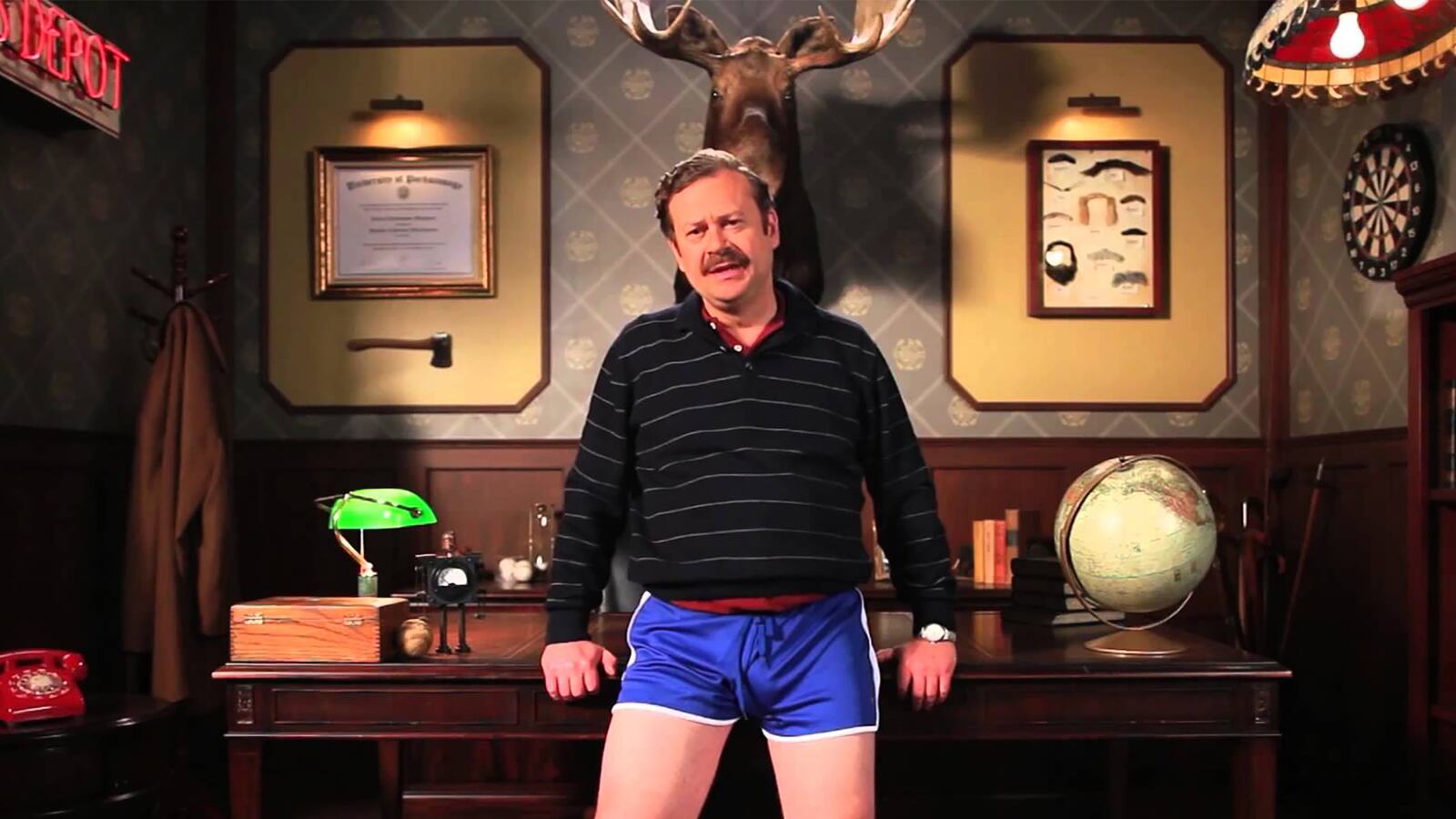Dr. Rich Mahogany, a mustachioed man with a paunch and a penchant for cursing, orders visitors to his taxidermy-filled office to “take a knee.”
He promises they’re in a safe space where “men come to be men,” as evidenced by the leather furniture and sports equipment in the corner.
Mahogany doesn’t tolerate “complaining, whining, and moping about,” but insists even “real men” could benefit from a man-to-man chat about their mental health.
It’s called “Man Therapy,” and while Mahogany is both a fictional character and a caricature of masculine stereotypes, the services he runs out of his virtual office are not a joke. He is the Internet’s macho, middle-aged answer to Mrs. Doubtfire.
“We’ll be getting off our keisters and form-tackling feelings like anger, sadness, substance abuse, and even suicidal thoughts head on!” he tells visitors to the website, a 24/7 online service that encourages men to seek help for mental health issues who wouldn’t ordinarily do so.
Man Therapy launched in July 2012 in Colorado as a partnership between the state’s public health department and Cactus, a Denver-based ad agency that specializes in public health campaigns.
“There’s a stigma around mental health and suicide, especially among men,” said Joe Conrad, founder and CEO of Cactus. “And we wanted to build a bridge to get people talking about it through humor and technology.”
Those who visit the site are prompted by Mahogany to complete an 18-point “Head Inspection,” a multiple-choice questionnaire about their sleeping habits, general mood, sexual appetite, and stress levels.
They are then given a sort of report-card assessment of their mental health with tips and resources for addressing issues like depression and anxiety.
These include everything from an alphabetical list of “manly” DIY self-improvement activities like bird watching (“there’s something oddly relaxing about watching our tiny-feathered friends go bananas over a bit of birdseed,” Mahogany’s manual reads) to links to suicide hotlines.
The site also connects people to therapists all over the country, with the option of filtering them according to specialization. Mahogany directs users around his virtual office, where they can watch video testimonials from other “real men” who have struggled with various forms of mental illness.
Since launching three years ago in Colorado, Man Therapy has partnered with public health departments in Wisconsin, Idaho, Ohio, Pennsylvania, Massachusetts.
The site has attracted 800,000 unique visitors, 85,000 of whom have completed the 18-point “Head Inspection.”
Of these visitors, 51 percent have said that Man Therapy made them more likely to seek additional help (roughly 15 percent have actually gone on to do so, according to Conrad).
Conrad said that while suicide rates among men are particularly high in “rural western states where there’s a cowboy-up mentality,” the stigma surrounding male mental health is problematic everywhere.
While one of Man Therapy’s long-term goals is to reduce suicide rates in the U.S., the site is really a resource for men who have never before addressed mental health issues.
The character of Dr. Rich Mahogany (played by Colorado stage actor John Arp) was created to engage these men.
“We wanted the face of Man Therapy to be as broadly appealing as possible, to be both humorous and effective in delivering the message that mental health is an important issue,” Conrad said, adding that user responses to their macho caricature have varied.
“We’ve had some people write or email in and say that he’s crass and perpetuates male stereotypes, and then we’ve had others who think he’s a wimp,” he said.
Mahogany is popular enough that Man Therapy has spread to Australia, where they’ve partnered with beyondblue, an organization devoted to raising awareness about depression and anxiety.
Most recently, Man Therapy has teamed up with the Utah Department of Health. (Utah has the fourth-highest suicide rate in the country, and three out of four people who commit suicide are men.)
Andrea Hood, the DOH’s suicide prevention coordinator, said the department was looking for a public health campaign that specifically targets men at a working age—the most at-risk men in Utah—when they stumbled on Man Therapy.
“We were excited to find a campaign that specifically addressed this demographic,” Hood said. “Men who don’t typically engage in treatment respond well to its humorous approach.”
As the demand for Man Therapy grows, its visionaries are putting the finishing touches on the website’s relaunch, building it on an up-to-date technology platform and offering even more resources to users.
Clearly the concept is working: Several months ago, Conrad and others at Man Therapy received a voicemail from a man in Michigan who broke down over the phone and said the website had saved his life.






